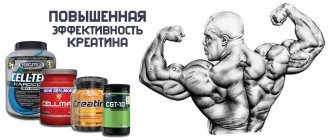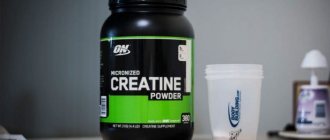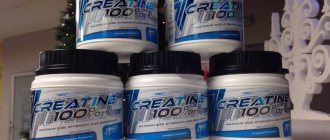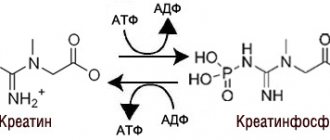Efficacy of the drug
Creatine hydrochloride, compared to other analogues, dissolves much better in liquid and is absorbed much faster. This helps reduce the risk of adverse reactions from the gastrointestinal tract. In addition, the concentration of anabolic hormones increases.
Creatine hydrochloride is expensive. This is due to improved purification technology for this substance. However, there is official evidence that one and a half grams of hydrochloride can replace five grams of monohydrate, which significantly saves money.
Which creatine is best?
Creatine monohydrate powder is more profitable and of higher quality. Creatine powder is almost always cheaper than capsules and tablets. In addition, it is better absorbed. most effective supplement . The most studied form of creatine - all the effects and recommendations are associated with it. The remaining forms of creatine are creatine monohydrate + something else. Many brands are trying to invent their own type of creatine and present it as a scientific breakthrough. This is nothing more than marketing. None of these forms showed better effectiveness compared to the monohydrate.
We prefer well-known and proven brands:
- Optimum Nutrition
- Universal Nutrition
- NOW
- muscletech
- MyProtein
There are other good brands, but these are the ones we trust. By the way, it is at the top of most world sports nutrition ratings.
Creatine hydrochloride: reviews of the drug
Many athletes note that creatine hydrochloride tastes too sour. This deficiency can be neutralized without problems if you dilute the drug in sweet juices or purchase multicomponent supplements.
The drug is highly effective, so you shouldn’t give it up and choose more palatable mixtures. Not all athletes trust this supplement, since it appeared on the sports nutrition market relatively recently, which means not many have had time to experience its effects on themselves.
Moreover, it should be taken into account that creatine hydrochloride is a sports supplement and it cannot build beautiful muscles without a comprehensive diet, intensive training and full recovery after it.
Expert reviews[edit | edit code]
We begin our assessment by quoting a 2011 article by Ben Esgro, BS:
“To date, there are no published controlled studies of creatine hydrochloride and no data to support any of the manufacturer's claims.”
Currently the situation has not changed. Doubts remain and are increasing. We tried to collect available facts that allow us to evaluate Con-cret objectively. In the pharmaceutical industry, hydrochloride is very often added to the active substance to increase its solubility and, as a result, bioavailability. However, a positive effect is not always achieved. [1]
This fact raises the question, why, after so many years of experimental work on creating a new form of creatine, no one thought of testing creatine hydrochloride, given that this salt is often used for these purposes?
Mark Faulkner, the inventor of this form, writes:
We have finally studied this molecule after first synthesizing it in 2003.
This happened by chance while we were working on creating creatine ethyl ester hydrochloride. We made a batch of creatine hydrochloride by mistake. Question: why on earth did you have to wait 6 years before starting work on a more promising form?
An open thread on the BB.com forum also reveals that Mark Faulkner was involved in the development of the well-known creatine ethyl ester.[2]
Let us recall the history of the esterified form, which very much resembles, or rather completely repeats, what is now happening with creatine hydrochloride:
- A new form has been synthesized
- A beautiful scientific rationale is given and one study that has not been published anywhere
- A wide advertising campaign has been launched
- Popularity increases sharply, numerous positive reviews and high ratings
- Disconfirming studies come out and history comes to an end
Looking at creatine hydrochloride, we have:
- A new form has been synthesized (in the best traditions of pharmacological science fiction, “by mistake,” which undoubtedly makes creatine hydrochloride stand out from the general series)
- The rationale for effectiveness is practically impeccable, but there is only one study and has not been published anywhere
- A lot of noise and active publication (many magazines quickly placed Con-cret in the top and published laudatory articles). The most famous of them: POWER Magazine, Muscle & Fitness, Planet Muscle, Powerlifting USA and many others.
- As a result, ratings increased, in some places naturally, but in others perhaps not. The placebo effect and mass opinion work flawlessly, as proven by the experience of Creatine Ethyl Ester. People still believe that this form is better than the monohydrate.
- ???
There are also many doubts regarding solubility: if the stomach, as a rule, always contains about 1 liter of liquid, then the monohydrate will be easily soluble in a dose of 10 g, why 59 times more? This will not affect the speed of absorption. Similar doubts are expressed in many foreign forums. For your information, we offer a topic with official answers from the inventor, Mark Faulkner (last messages from April 2012): https://www.ironmagazineforums.com/supplements/111826-creatine-hydrochloride-vs-monohydrate.html
Conclusion
We cannot accurately answer the question about the effectiveness of creatine hydrochloride, since there are currently no results from independent studies. However, in all other respects there are clear similarities with the esterified form: the same inventor, the same marketing strategy, the same incredible benefits. Given that the previous campaign was an excellent success, why not do it again? Taking into account the above facts, the superiority of the supplement is still in great doubt.
By the way, it is worth noting that creatine hydrochloride began to be actively produced in China. 1 kg of product costs only 240 rubles. with a purity of 99%.[3]
Recommendation for adherents[edit | edit code]
I would also like to add that Con-cret research was carried out by Vireo System, which is known for another development - StayActiv. This supplement is a mixture of amino acids. It is used as a pain reliever with an “incredibly powerful” and “absolutely proven” effect. The composition contains only a mixture of several amino acids. No pharmacologist in his right mind would believe in its effectiveness. But if you are confident in Con-cret, then you will undoubtedly like StyayActiv. With its help, you can eliminate even severe pain by simply rubbing amino acids into the right place. Reviews from practitioners: Dear, you can talk about the effectiveness of creatine hydrochloride here as much as you like, but it’s better to see once than to hear a hundred times, isn’t it? I’ve personally tried hydrochloride more than once and I absolutely don’t care about the opinions of local experts - I’m absolutely confident in positive effect, and specifically in increasing strength endurance when using hydrochloride! There is not much of this undervalued product on our market. I would suggest writing reviews here from trainees, but only with a decent amount of training experience and preferably “pure” athletes (like me)) then I mean, without AS. I haven’t heard phenomenal reviews about it, or any other sports nutrition, but it’s the hydrochloride that really raises you one or two steps in your strength training! I specifically haven’t been drinking creatine for a month, but in 5 days they will bring me creatine hydrochloride, which, unlike monohydrate (also a very effective product, by the way), does not require more than a week to start working, and everything is felt literally in two or three days. In general, I’m tired of writing, only from training... by the way, my experience is almost 15 years, mainly in amateur powerlifting.
How to take creatine hydrochloride
Among novice athletes, the question is whether creatine hydrochloride is effective, how to take the supplement so that it gives a positive result? This information is indicated on the drug packaging, but users cannot always understand the instructions, since they are often not translated into Russian.
An athlete needs 2 g of creatine hydrochloride per day. It is allowed to divide the portion into two doses. The supplement can be taken before and after training. It is best to take the capsules with grape juice or water.
If creatine hydrochloride is released in powder form, it can also be diluted in such a drink. The drug can be combined with BCAA, gainers, protein shakes, and combined with pre-pregnancy supplements. There is no need to follow a specific diet, since creatine does not affect the quality of absorbed substances from natural food. The duration of taking hydrochlorinated creatine should be 1.5 -2 months.
The effect of creatine. Why is creatine needed in sports and bodybuilding?
During intense anaerobic exercise lasting 5-15 seconds, muscles rely on phosphocreatine stores to resynthesize ATP. As stores become depleted, the body is forced to rely on other forms of metabolism for ATP, and performance begins to decline.
Creatine sports nutrition increases phosphocreatine stores, allowing muscles to work at higher intensities for longer periods of time. It is extremely beneficial for performance in high intensity, heavy lifting and strength sports that rely heavily on phosphocreatine stores for energy.
Video: the effect of creatine
Benefit for health
Creatine monohydrate has a complex beneficial effect on the body and provides several
results important for its full functioning:
- increases endurance and strength;
- helps increase muscle mass;
- helps make muscles more prominent;
- provides support for the cardiovascular system;
- protects the central nervous system;
- reduces recovery time after physical activity;
- normalizes blood cholesterol levels.
According to reviews from training athletes and estimates from some experts, muscle endurance during power loads increases by about 20-30%. In addition, the substance delays the moment of “acidification” of the muscles, which significantly benefits them during physical activity and allows you to increase training volume.
By increasing performance, an increased gain of muscle mass and volume is achieved. The athlete's endurance during training increases, and as a result of longer work, more active muscle growth is achieved. But creatine also retains moisture in the tissues, so you should not always mistake a sharp increase in muscle volume for their active growth, since it may simply be swelling caused by water retention in the tissues. At the same time, the additional volume of liquid has a beneficial effect on the supply of nutrients to cells.
Those using a sports supplement should remember that creatine does not directly determine a significant increase in muscle mass for athletes, but indirectly, providing appropriate training with progressive load.
creatine for weight gain
Creatine monohydrate counteracts the release of lactic acid into muscle tissue. Troubles associated with an excess of this acid, in addition to burning sensations after a certain cycle of movements, can significantly reduce strength endurance and increase recovery time between exercises.
By maintaining the maximum concentration of the substance, the recovery time after training is significantly reduced, so you can do it more often. So, for example, when practicing bodybuilding, a course of the drug can give the athlete 5-6 additional workouts per month.
Under the influence of creatine, the work of all muscles in the body improves, including the heart, and the substance also helps strengthen blood vessels and improve the conduction function of the nervous system. Therefore, creatine monohydrate provides overall tone to the body and improves well-being.
What are the benefits of creatine monohydrate
It is mainly popular among athletes and weightlifters because its effects are associated with physical exercise that requires a sudden, powerful release of energy.
It can also significantly improve high-repetition training, and there is some evidence that creatine supplements improve endurance.
Plus, it has several unique health benefits that are not associated with exercise. Let's take a closer look at some of the effects of this sports supplement...
Research
Scientific studies have proven that supplementing with creatine has the effect of increasing muscle phosphocreatine stores by 10% to 40%.
Athletes who follow diets low in meat and fish or who are vegetarians tend to experience the greatest increase in phosphocreatine stores.
In the short term, creatine sports nutrition has been shown to improve maximal strength and power by 5%-15%.
Performance during one sprint increases by 1% -5%, and work performed over several maximal sprints or strength training increases by 5% -15%. Plus, long-term dietary supplementation with creatine can improve the conditioning effect by 5%-15%, improving strength, power and body mass gains.
There are several forms of creatine, including creatine salts (creatine citrate, maleate, fumarate, tartrate, pyruvate), creatine ethyl ester and Crealkaline. No form of creatine has been scientifically proven to be more effective than creatine monohydrate.
Creatine monohydrate
D-pinitol and Russian tarragon (Mugwort tarragon) are commonly added to creatine sports nutrition to enhance performance. However, the evidence to support this is inconclusive.
One of two studies of D-pinitol found that small doses were effective and increased creatine absorption (2001); however, the results of another study did not confirm any benefits (2009).
Creatine Monohydrate and Strength Gain
In 2003, scientists at Bloomsburg University analyzed the top 22 studies on creatine to see how effective it was.
They tracked how much weight athletes could lift for 1, 3 and 10 reps while following a strength training plan over several weeks.
On average, people who took creatine were able to lift 20% more weight, while people who took a placebo improved by 12%.
In other words, on average, strength increased by 8%.
Interestingly, creatine supplementation was particularly effective in increasing bench presses, ranging from 3 to 45%.
Here's what the scientists concluded:
There is substantial evidence that strength training combined with creatine is more effective than the same exercise without taking it, although the response varies greatly between individuals.
Due to its ability to enhance acute muscle contraction, it helps improve performance in sprinters, swimmers, wrestlers and weightlifters. It is worth noting that if you are a vegetarian, you will most likely notice a very significant increase in strength and vitality. Plant-based diets tend to contain very little creatine because the best sources are meat, poultry, and fish, so it's not surprising that vegetarians see the most dramatic effects.











